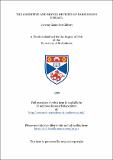The cognitive and motor deficits of Parkinson's disease.
Abstract
Deficits of attentional and motor set that are seen in patients with PD were investigated in the research reported in this thesis. A deficit of attentional set is a failure of selective attention to one aspect of a complex stimulus. Deficits of motor set manifest as an inability to form a state of motor 'readiness' that can speed movement initiation. Attentional set was investigated with tasks that require patients to shift attention between perceptual dimensions (extradimensional - ED - shifting tasks), and motor set was studied using reaction time (RT) tasks. Study 1 rejected the hypothesis that the mechanism of 'learned irrelevance' causes ED shift deficits in patients with PD. Studies 2 and 3 confirmed that learned irrelevance also plays no role in determining the difficulty of ED shifts in healthy subjects. The experimental manipulation used in Study 4 succeeded in creating changes in scores that resembled those seen in patients with PD. Thus, it appears that patients with PD may have a deficit similar to that induced by the experimental manipulation - that is, an inability to attend to all dimensions present when hypothesis testing after an ED shift. A quantitative analysis of past RT studies of PD showed that the ability to speed movement initiation when given advance information about an upcoming movement - a form of motor set - is intact in patients with PD. In contrast, the motor set that underlies rapid simple RT performance is consistently dysfunctional in patients with PD. Study 5 investigated temporal and spatial motor set in PD, finding that these two mechanisms are functionally separate and that temporal motor set is intact in PD. A final study (Study 6) investigated the cognitive consequences of a novel neurosurgical treatment for PD, finding it to be largely a neuropsychologically 'safe' procedure.
Type
Thesis, PhD Doctor of Philosophy
Collections
Items in the St Andrews Research Repository are protected by copyright, with all rights reserved, unless otherwise indicated.

